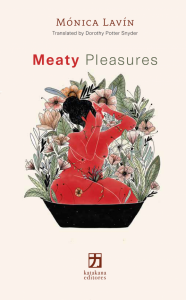In Case of Emergency, our Book Club selection for December, is a novel that does not stand still. Led by the frenetic pace of its narrator, Shadi, it journeys across disaster-ridden Tehran in an unrelenting, electric surge. Mahsa Mohebali’s prose, gritted in satire, unwaveringly paints a linguistic celebration of Iranian vernacular, as well as a transgressive portrait of feminine anti-heroism. For the arrival of this world in English, we have to thank the brilliant work of Mariam Rahmani, to whom Assistant Editor Lindsay Semel spoke with in live dialogue, discussing the translation of humour, the transgression of Shadi, and the many voices that live inside a single individual.
The Asymptote Book Club aspires to bring the best in translated fiction every month to readers around the world. You can sign up to receive next month’s selection on our website for as little as USD15 per book; once you’re a member, join our Facebook group for exclusive book club discussions and receive invitations to our members-only Zoom interviews with the author or the translator of each title.
Lindsay Semel (LS): In choosing to translate this title, you’ve talked about some of your motives being political, and about how radical of a character Shadi is. Now that the book is out of your hands and into the world, you’re receiving a lot of media attention regarding that thread of the book. Now that the conversation has become public, how do you feel about the politicization of the text and the discourse around it?
Mariam Rahmani (MR): In Case of Emergency is a political novel, so in that sense, the reception hasn’t politicized it. However, I really believe that [the political] is only one level on which the novel is operating in its original context—another level being that of craft. From what I have seen of the conversation that has ensued since the novel’s publication, however, I think it’s been pretty well understood and well interpreted; it hasn’t struck me as moving in any wrong direction.
I think the novel speaks substantially to politics that really resonate with contemporary readers outside of Iran—particularly regarding gender and sexual issues. They perhaps figure more quietly here than we might expect in a contemporary Anglophone novel, but are quite present and resonant in certain ways. All of that is familiar in one sense, but nevertheless it establishes the presence of a contributing voice, intersecting in an ongoing conversation readers are already having outside of translated literature.
LS: Is Shadi’s subversiveness the main thing that you want readers to engage with?
MR: As a translator, I don’t think that it’s my place to tell people how to relate to the text or how to relate to Shadi; my goal is to present what I think is a faithful rendition of the landscape that the novel presents in Farsi. Shadi speaks for herself, and various readers will relate to her in different ways. Maybe some readers will connect with the crassness or jocularity of the voice. Other readers might be more attuned to her crossdressing or the flirtations she has throughout the novel. Or they could identify with the general dissatisfaction Shadi has with the world around her, complicated by the respectability politics she encounters throughout the text, whether at home with her family or [on the street]. All these elements are there, and the world is full enough that different readers will connect to different aspects of her character, as well as to the critique she is waging. READ MORE…



